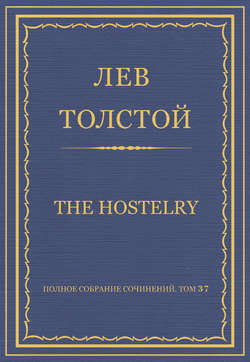Читать книгу Полное собрание сочинений. Том 37. Произведения 1906–1910 гг. The hostelry - Лев Толстой - Страница 5
НЕОПУБЛИКОВАННОЕ, НЕОТДЕЛАННОЕ И НЕОКОНЧЕННОЕ
Оглавление* THE HOSTELRY
(A parable for children)
There was a benevolent man who wished to do as much good as he could to men, and he bethought himself that the best way to do this was to....[1] an inn in such a place where many people passed and of furnishing it with all that could be of use or give pleasure to men. So he arranged a hostelry with comfortable rooms, good stoves, fuel, lighting, store-rooms full of every kind of provisions, vegetables and all sorts of refreshment, also beds, every kind of clothes, underwear and boots in such quantities as to suffice for a great quantity of people.
Having arranged all this the benefactor wrate very distingly a direction how to use his hostelry and all the thing that where gathered in it. This decretion the benefactor nailed on the entrance door so that every man should see it. In the direction it was writen that every man who entered the hostelry might stay in it as long as it was good for him and might eate and drink at his heart content and use all what was gathered in the inn clothes or boots or kind of provisions. The sole condition which was required from the travelers was that they schould take only what they needed presently and that they should help each other and leaving the hostelry made things tidy as before their arrival.
Having arranged all this and written and hanged on the door this direction the benefactor himself retired.
But it came to pass that when people came ent the hostelry they ded not look at the direction and began to use all the goods that where at their desposal without thinking of other people and triing to get all the thinges allthough not needed all everybody for himself.[2] They took began to quarrel between themselve over the goods. In snatching goods from each other spoiled them and sometime spoiled things aut of selfish spite in order that others schould not get them.
So that havend spoiled everything in the inn, they began to sutler from cold and hunger, and from the injuries they themselves had inflicted on each other, and abused their host for having prepared too little goods, for not having placed caretakers, tor having allowed all sorts of bad men to enter. Others said that there egisted no anybody to abuse and that the hostelry had no master and had come into egistence (by itself) and that a bad damned place.
In this same way behave in our world people who dos not read the direction of our life writen in our hearts and in all the great teachengs of our wise men [1 не разобр.] and others, live by their own will and not by the will of their benefactor. They ruin their own lives and that of others and condemn for it each other, God, the world only not themselves.
If only men understood that their wellfare depends only from themselves and if they did the will of their benefactor, they would enjoy such welfare, greater than which they could imagine.[3]
ГОСТИНИЦА
(Сказка для детей)
Один благотворитель хотел сделать людям так много добра, как только мог, и он решил, что лучше всего для этого построить гостиницу в таком месте, где проходит много народу, и снабдить ее всем, что только может доставить людям пользу и удовольствие. Итак, он устроил гостиницу с удобными комнатами, хорошими каминами, украшениями, освещением, кладовыми, полными всякого рода продуктов, овощей и всякого сорта освежительных напитков, а также кроватями, различным платьем, бельем, обувью в таком количестве, чтобы хватило на большое количество людей.
Устроив всё это, благотворитель написал очень отчетливо правила, как пользоваться его гостиницей и всеми вещами, которые были в ней собраны. Эти правила благодетель прибил гвоздями на входной двери так, чтобы каждый мог их видеть. В правилах было написано, что каждый человек, который входит в гостиницу, может оставаться в ней столько, сколько ему надо, и может есть и пить сколько душе угодно и пользоваться всем собранным в гостинице платьем, обувью и провизией. Единственное условие ставилось путешественникам: чтобы они брали только то, что им нужно сейчас, и чтобы они помогали друг другу, а оставляя гостиницу, приводили вещи в тот же порядок, какой был до их приезда.
Устроив всё это и написав и вывесив на двери правила, благотворитель удалился.
Но случилось так, что, когда люди пришли в гостиницу, они не посмотрели на правила и стали пользоваться всеми бывшими там вещами по своему желанию, не думая о других людях и стараясь захватить себе самим все вещи, хотя бы они были им и не нужны. Они начали ссориться между собою из-за вещей. Хватая их из рук друг у друга, они портили их, а иногда портили и из зависти, чтобы другие не могли ими воспользоваться.
Так перепортив всё в гостинице, они начали страдать от холода и голода и от несправедливостей, которые они нанесли друг другу, и стали обвинять их хозяина за то, что он приготовил слишком мало вещей, за то, что он не поставил сторожей, за то, что разрешил вход всяким злым людям. Другие говорили, что обвинять некого, что у гостиницы нет хозяина, что гостиница возникла сама по себе и что это плохое, проклятое место.
1
Многоточие поставлено, очевидно, вместо глагола; первоначально Толстой наметил три глагола: to arrange, to errect, to faund (found).
2
Далее случайно осталось незачеркнутым: hostelery.
3
Далее следует помета Толстого простым карандашом: (represent to themselves)?
